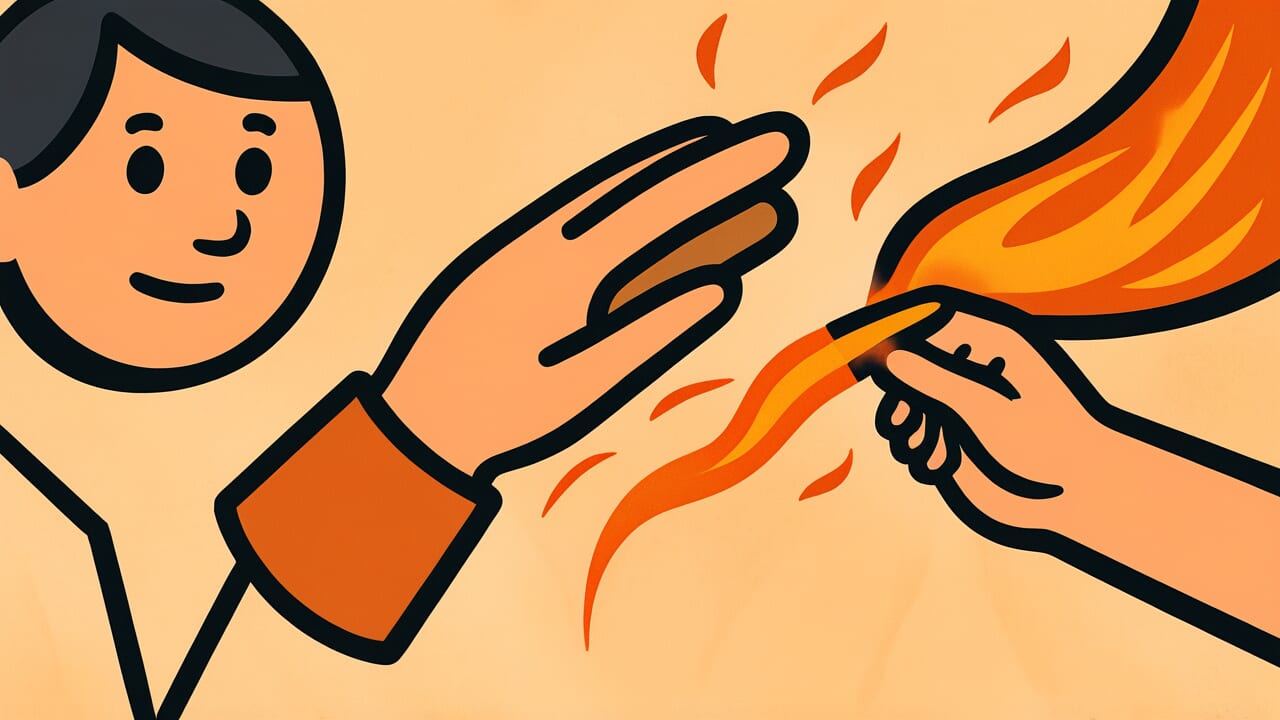How to Read “If you play with fire you will get burned”
If you play with fire you will get burned
[if yoo play with FY-er yoo will get bernd]
All words use standard pronunciation.
Meaning of “If you play with fire you will get burned”
Simply put, this proverb means that taking dangerous risks will eventually lead to getting hurt.
The literal words paint a clear picture. Fire burns anything that gets too close. If someone plays around with flames, they will eventually touch them and get burned. The deeper message warns us about risky behavior in general. When we do dangerous things repeatedly, we cannot avoid the consequences forever.
We use this saying when people take foolish risks. Someone might gamble away their savings, lie to their boss, or drive recklessly. Friends and family often say this proverb as a warning. It applies to work situations, relationships, and daily choices. The message is always the same: dangerous actions lead to painful results.
What makes this wisdom powerful is its certainty. The proverb does not say “you might get burned.” It says “you will get burned.” This confidence comes from observing human behavior over time. People who take the same risks over and over eventually face the consequences. The proverb reminds us that luck runs out.
Origin and Etymology
The exact origin of this proverb is unknown, but similar warnings about fire appear in many ancient cultures. Fire has always been both useful and dangerous to humans. Early communities needed fire for warmth and cooking, but they also feared its destructive power.
During medieval times, when most people lived in wooden houses, fire posed constant threats. Entire villages could burn down from a single careless mistake. People learned to respect fire through painful experience. Sayings about fire’s dangers became common wisdom passed down through generations.
The proverb spread through oral tradition before appearing in written form. Different languages developed similar expressions about fire and consequences. As people moved between communities, they shared these warnings. The saying eventually became part of everyday speech. Today we use it for any risky situation, not just actual fire.
Interesting Facts
The word “play” in this context comes from an older meaning of “to toy with” or “handle carelessly.” This usage suggests treating something dangerous as if it were harmless fun.
Fire metaphors appear in proverbs across many languages because fire was humanity’s first controlled but unpredictable tool. The experience of managing fire taught early humans about risk and consequence.
The proverb uses simple, concrete imagery that makes abstract concepts easy to understand. This technique helps people remember important warnings through vivid mental pictures.
Usage Examples
- Mother to teenager: “I know you think cheating on tests is no big deal, but the teachers are getting suspicious – if you play with fire you will get burned.”
- Friend to coworker: “You keep badmouthing the boss in front of everyone – if you play with fire you will get burned.”
Universal Wisdom
This proverb reveals a fundamental truth about human nature: we often underestimate risks when we feel in control. The warning resonates across cultures because it addresses our tendency to push boundaries until reality pushes back. Fire represents any force that seems manageable until it suddenly is not.
The deeper wisdom lies in understanding why people “play with fire” despite knowing the dangers. Humans are naturally curious and often overconfident. We test limits to feel powerful or prove ourselves. Risk-taking can bring rewards, which makes the behavior tempting. But the proverb reminds us that some risks carry inevitable consequences, regardless of our skill or luck.
What makes this truth universal is the pattern it describes. Every generation watches some people take dangerous shortcuts or ignore obvious warnings. These individuals often succeed initially, which reinforces their risky behavior. But the proverb captures what observers notice over time: consistent risk-taking eventually catches up with everyone. The fire always wins in the end, not because it is malicious, but because it follows natural laws that do not bend to human wishes or confidence.
When AI Hears This
The brain tricks us into thinking danger feels good because we survived it. Each close call releases chemicals that make us feel amazing. Our minds confuse this rush with being skilled or lucky. We start craving that intense feeling of almost getting caught or hurt.
This creates a hidden trap most people never notice. The more we flirt with disaster, the more normal it feels. Our judgment gets worse right when we think it’s getting better. We mistake feeling comfortable with danger for actually controlling it safely.
What fascinates me is how this flaw might actually help humans grow. Taking calculated risks built civilizations and sparked discoveries throughout history. The same brain wiring that makes us play with fire also pushes us to explore unknown territories. Perhaps getting burned occasionally is the price for human progress and innovation.
Lessons for Today
Living with this wisdom means developing better judgment about which risks are worth taking. Not all risks are equal, and some dangers truly are inevitable if we persist. The key insight is learning to distinguish between calculated risks and reckless behavior.
In relationships, this wisdom helps us recognize destructive patterns. Someone who repeatedly lies, cheats, or manipulates others will eventually face consequences. We can choose whether to enable this behavior or protect ourselves from the inevitable fallout. The proverb reminds us that we cannot save people from consequences they consistently choose.
At a community level, this wisdom applies to collective decisions about safety, environment, and shared resources. Groups that ignore long-term consequences for short-term gains eventually face serious problems. The challenge lies in recognizing when we are collectively “playing with fire” before the damage becomes irreversible. Understanding this proverb helps communities make wiser choices about sustainable practices and risk management, even when immediate consequences seem unlikely.



Comments